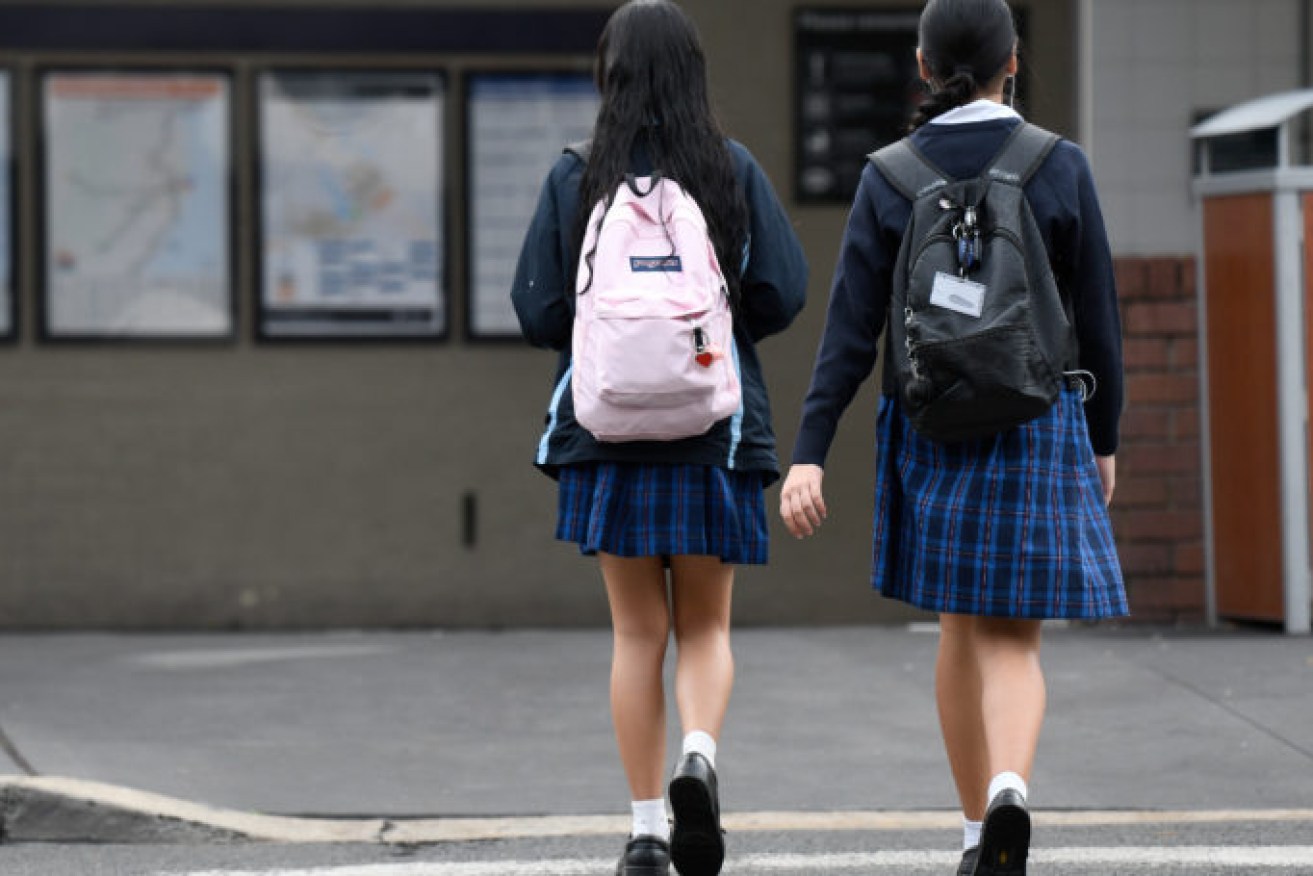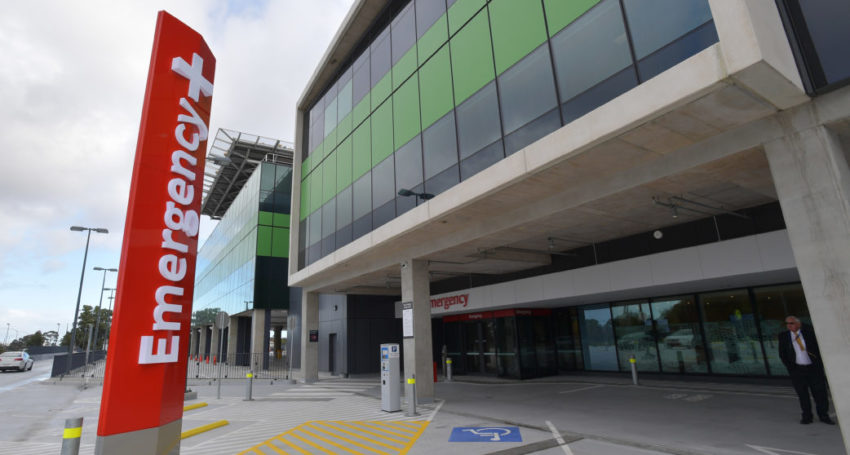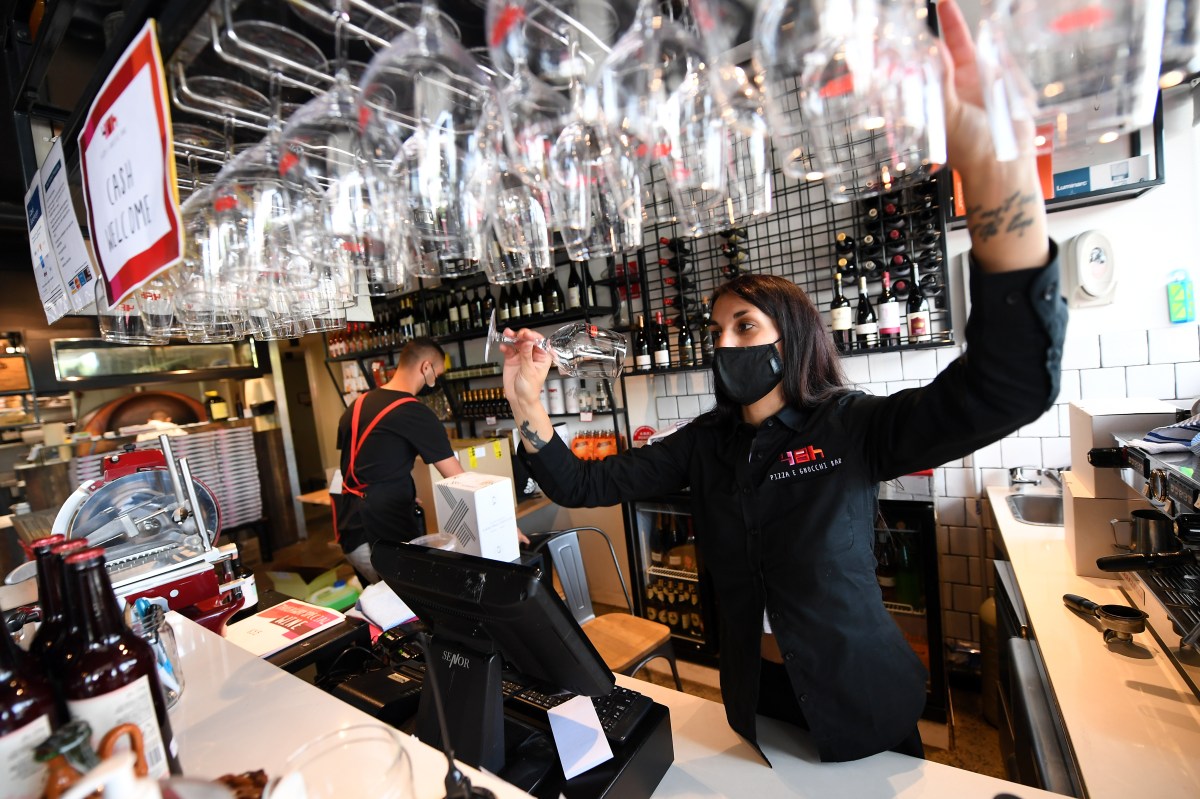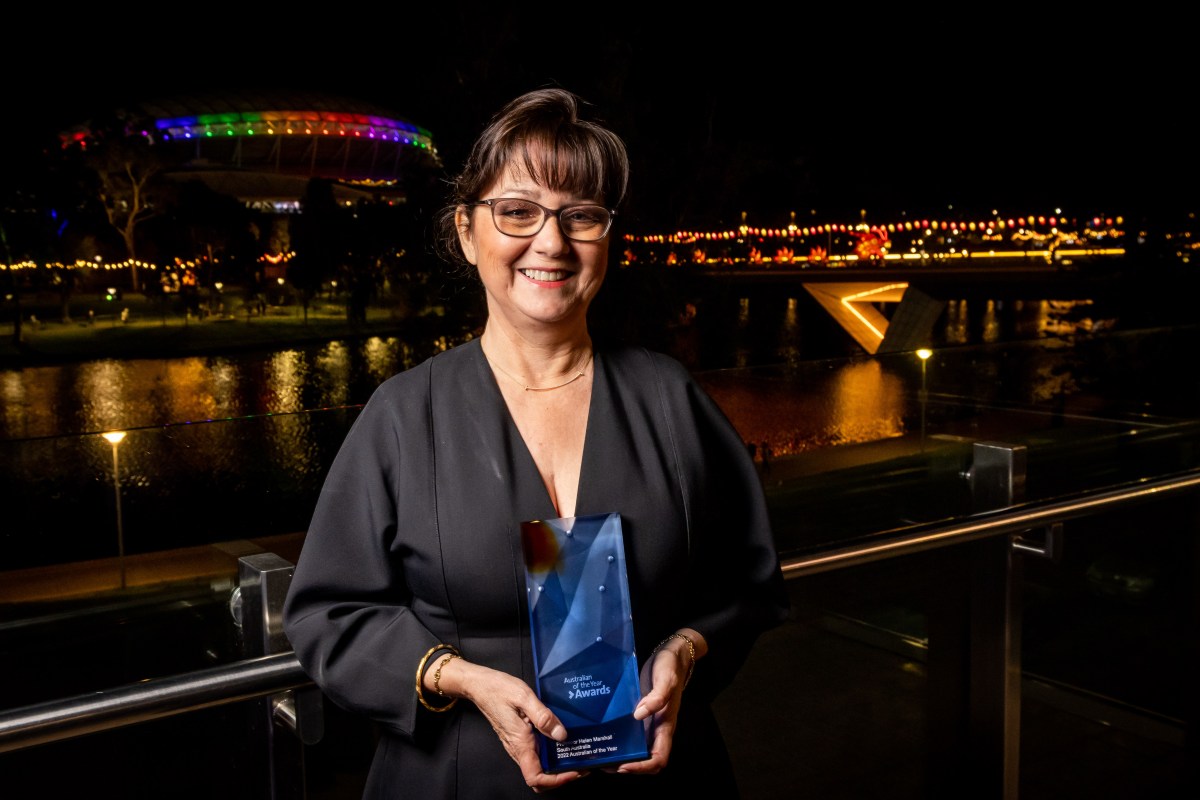What we know today, Friday October 22
Masks will no longer be mandatory for South Australian high school students and the state’s hard border with Broken Hill and Portland will be lifted following a meeting of the transition committee today.

Photo: Bianca De Marchi/AAP
- Masks now optional for SA schools
- Warning ‘fatigue’ impacting SA mask compliance
- Qantas brings forward international flight schedule
- Coalition confident of net-zero deal
- Victoria posts 2189 COVID cases, 16 deaths
- NSW records 345 cases, five deaths
- Russell Ebert elevated to Sport SA Hall of Fame ‘legend’ status
- SA hospital workers in strike action
- Melbourne emerges from sixth lockdown
- Vaccine expert crowned SA’s 2022 Australian of the Year
- Joyce given green-light to strike climate deal
- AFL mandates COVID-19 vaccinations
Masks now optional for SA schools
Masks will no longer be mandatory for South Australian high school students and the state’s hard border with Broken Hill and Portland will be lifted following a meeting of the transition committee today.
Premier Steven Marshall announced a short time ago that from Monday, mask wearing in schools would be a choice for individual schools and students.
“I know this is going to be a lot of relief to students who have really done the right thing,” he told reporters.
Marshall said the restrictions lift was “all on the back of very good vaccination rates in South Australia”.
“We’re heading towards 80 per cent single vaccination rate in South Australia … that makes me feel more and more confident that we are going to get to 80 per cent double vaccinated. In November, not December,” he said.
Just over 78 per cent of South Australians over the age of 16 have had a first dose of a COVID-19 vaccine, according to the latest federal government data.
Mask rules for all students in year 8 and above have been in place since the start of term 3.
The regulations, which stipulate that children must wear masks on public transport, indoors and while travelling on school buses, were introduced following the state’s seven-day July lockdown.
The rules also applied to teachers on public transport and on buses but not while teaching.
Among the other COVID restrictions axed today include the “double quarantine” requirement for arrivals who land in Sydney and transit to Adelaide, and the seven-day testing requirement for cross border travellers.
South Australia’s hard border with the New South Wales town of Broken Hill and the Victorian town of Portland will also be eased on “Monday or Tuesday next week”, with the transition committee to provide further advice next week.
Marshall also said the State Government was in the “final stages” of receiving detailed modelling from the Doherty Institute on how South Australia’s health system will cope when restrictions will ease.
Warning ‘fatigue’ impacting SA mask compliance
South Australia’s deputy chief public health officer has issued a reminder for people to continue wearing face masks while inside public venues amid concerns about mask “fatigue” across the community.
Dr Emily Kirkpatrick told reporters this morning that authorities had “absolutely seen that there is fatigue around mask-wearing and compliance”, following months of ongoing regulations that mandate the wearing of face masks inside public venues.
She said SA Health was continually reviewing its advice about mandated mask-wearing, but for now, the risk of the COVID-19 delta variant making its way into South Australia meant no changes would be made to the requirement.
“What we have to do is remind the community about the role and importance of masks, particularly in those indoor settings where we know we’ve got large groups of people, and in our high-risk settings… (such as) aged care and hospital facilities,” she said.
“They’re the critical sites where we need to make sure with this continuing risk we have in the eastern states that we are protecting our most vulnerable individuals within our healthcare system and also within our aged care settings as well.”
Kirkpatrick acknowledged that other so-called “COVID-zero” states such as Western Australia and Queensland had more relaxed mask-wearing requirements in place, but she said South Australia had decided to maintain a “consistent policy”.
“We do need to move very quickly if we were to have a case here in South Australia,” she said.
“We know with how quickly the delta variant can transmit that it may be then three chains down as part of that level of transmission (before it is detected).
“But having a mask you no only protect yourself but you protect other people around you.”
Kirkpatrick told a parliamentary committee yesterday that authorities were yet to decide whether the mask-wearing regulations would remain in place once 80 per cent of the state is double-vaccinated.
Meanwhile, Health Minister Stephen Wade said the Government was still “days away” from receiving final modelling from the Doherty Institute showing South Australia’s projected surge in COVID cases once it reopens to the eastern states.
He said South Australia was “weeks away from reopening our borders”, but clarified that the borders wouldn’t reopen until 80 per cent of the state was double-vaccinated.
Qantas brings forward international flight schedule
Qantas will bring forward restarting international flights to popular destinations and launch a new route to India.
Massive demand for air travel has been triggered by the announcement Australia’s international border will open on November 1 in NSW.
Qantas chief executive Alan Joyce – alongside Prime Minister Scott Morrison -on Friday announced major changes to the national carrier’s flight schedule.
All stood-down Qantas and Jetstar workers, including 5000 employees linked to domestic travel and 6000 to international, will return to work in early December.
A new route between Sydney and New Delhi will launch on December 6 with three flights a week.
Sydney to Singapore flights will resume on November 23, four weeks earlier than scheduled, operating three days a week before ramping up to daily before Christmas.
Sydney to Fiji will be brought forward to December 7 for four flights a week.
Qantas will fly from Sydney to Johannesburg three times a week from January 5, three months earlier than scheduled.
From January 14, the airline will resume its Sydney to Bangkok services more than two months earlier than expected, while Jetstar flights to Phuket will start on January 12.
Sales on already announced Qantas flights to London and Los Angeles have been strong, with some selling out in hours after the border announcement.
Joyce said it was big news for Australia after Qantas experienced its darkest period during the coronavirus pandemic.
“It has meant we have had to ground aircraft, stand down people and restructure the business. But there is light at the end of the tunnel,” he told reporters at Sydney Airport.
“It is very clear that because Australians have rolled up their sleeves and taken the jab, we can see that light.”
Flights to Honolulu, Vancouver, Tokyo and New Zealand are still scheduled to commence from mid-December 2021, with other destinations to restart in the new year.
All travellers will have to be fully vaccinated and will be required to test negative for coronavirus within 72 hours of departure.
Coalition confident of net-zero deal
Scott Morrison is on the cusp of securing the Nationals’ agreement for a target of net zero emissions by 2050, with conditions including ongoing support for agriculture and mining.
Nationals leader Barnaby Joyce delivered the junior coalition partner’s concerns to the prime minister on Thursday evening outlining a broad set of principles rather than specific projects or spending commitments.
At the heart of the Nationals’ concerns is what deeper emissions cuts will do to rural and regional jobs and industry, especially mining and farming.
The party will meet again on Sunday afternoon for an update on negotiations, with the coalition confident an agreement can be locked in early next week before Mr Morrison jets off for a G20 meeting in Rome.
He will then go to the COP26 climate summit starting in Glasgow on October 31.
Energy Minister Angus Taylor said it was right for the Nationals to be concerned about the future of industries like mining, heavy manufacturing and agriculture.
“Of course, the plan is all about making sure we strengthen those industries, not weaken them,” he told Sky News on Friday.
“The focus is on making sure that there’s upside for the regions, not downside.”
Agriculture Minister David Littleproud believes coal mining in Australia will continue well beyond 2040, regardless of a net zero target.
“Coal miners shouldn’t be shuddering in their boots. You’ll still have a job well beyond 2030, well beyond 2040,” he told ABC radio.
“We’ll still be digging coal up and we’ll be exporting.”
He does not expect all Nationals MPs to back net zero, but the coalition is increasingly confident of securing majority support.
“We only saw this plan last Sunday, which is very complex, and to be able to turn it around in the pragmatic way that we have, I think, shows an intent to try and work with our coalition partner,” Mr Littleproud said.
“Now the ball’s in the prime minister’s court to be able to work through that and come back to us so that our party room can meet on Sunday and obviously get to (a) determination.”
Victoria posts 2189 COVID cases, 16 deaths
Victoria has recorded 2189 new COVID-19 cases and 16 deaths as Melbourne emerges from lockdown and its residents flock to hairdressers, cafes and pubs.
The health department confirmed the numbers while unveiling a new data dashboard featuring hospitalisation figures.
There are 784 people in hospital, with 145 in intensive care including 94 on a ventilator.
The latest deaths are the highest daily tally of the state’s third wave and lifts the toll from the current outbreak to 203.
There were 77,036 tests processed and 38,339 COVID-19 vaccine doses administered at state-run hubs on Thursday.
NSW records 345 cases, five deaths
COVID-19 cases in NSW have fallen slightly but the state is bracing for a potential spike in case numbers, almost two weeks after stay-at-home orders lifted.
The state reported 345 cases on Friday, down from 372 on Thursday.
Five more people died, taking the death toll from this outbreak to 592.
The number of people in hospital continues to fall, now at 482 – some 41 of whom were from the previous day.
Despite the slight dip, case numbers are still higher than they’ve been for most of the past week.
Health authorities are expecting cases to begin rising in earnest from next week – two weeks after initial freedoms came in, and a week after the second stage of the roadmap out of lockdown allowed significantly more social interactions.
Premier Dominic Perrottet on Thursday said case numbers were still well below expectations.
“There will be increasing numbers, there will be an increase in hospitalisations,” he said.
“And that’s why I say to everyone across the state as we do open up, please follow the rules that are in place because those rules aren’t there for the sake of it.”
But authorities are hoping the high vaccination rates will suppress the rapid spread of the virus, or at least keep a lid on hospitalisations.
Chief health officer Kerry Chant warned earlier this week the expected rise in cases was yet to come and said her sights were set on getting at least 95 per cent of the state vaccinated.
“There’s a lot of uncertainties about what case numbers will do,” Chant said.
“Next week I will be really interested in what our numbers are.”
Russell Ebert elevated to Sport SA Hall of Fame ‘legend’ status
Port Adelaide great and four-time Magarey Medallist Russell Ebert has become just the seventh member of the South Australian Sport Hall of Fame to be elevated to “legend” status.
The three-time SANFL premiership winner, who played 392 senior games for the Magpies and dominated South Australian football in the 1970s and ‘80s, was unanimously recognised this week by the Hall of Fame Board of Governors as an athlete who holds “a revered place within the community” and delivered “exceptional performances that are almost beyond belief”.
Only Sir Donald Bradman, Bart Cummings, Victor Richardson, Gillian Rolton, Anna Meares and Ebert’s long-time friend and former rival Barrie Robran have been bestowed with “legend” status since the Hall of Fame was inaugurated in 2010.
On Thursday, Robran and Hall of Fame selection committee member Bruce McAvaney presented the award to Ebert and his wife Di at their home.
Robran paid tribute to the long-time Port Adelaide captain’s skills on the football field and the influence he had on South Australians throughout his playing career, while McAvaney lauded Ebert’s community work to reduce domestic violence, educate youth and support children with disability.
Upon learning of the award, Ebert – who has been battling an acute myeloid leukemia diagnosis since December last year – said he was “uncomfortable being elevated above others but I honestly believe this is about the contribution of my family, the club and community that have contributed along the way”.
“These types of awards are for everyone no matter what small or large part they played and so I thank everyone for the part they have played in my journey and in this acknowledgment,” he said.
“They all deserve a piece of the acknowledgement for themselves.
“I feel this represents our great state, our sporting community and clubs and in particular our sporting volunteers.”
– Thomas Kelsall
Read the full story here
SA hospital workers in strike action

Photo: AAP/David Mariuz
Allied health professionals from nine major public hospitals across South Australia will take stop-work action over a wages and conditions dispute with the state government.
The Health Services Union says the workers, which include physiotherapists, social workers, radiographers and occupational therapists, are taking a stand in response to the government’s “insulting, unfair and disrespectful” approach to enterprise agreement negotiations.
The union has been seeking a commitment to safe staffing levels and workloads, an extension of professional development entitlements and a commitment to revised classification structures as well as a fair pay increase.
“We note that the government has provided nurses, teachers and police with wage increases through the pandemic, however, the approach towards allied health and other health workers has been insulting, unfair and disrespectful of our critical work and contribution to the South Australian community,” the HSU said.
In response, it said workers would stage a series of one-hour rolling strikes across various hospitals on Friday.
Those to be impacted include the Royal Adelaide, the Women’s and Children’s, the Lyell McEwin and the Queen Elizabeth hospitals along with the Flinders Medical Centre.
Melbourne emerges from sixth lockdown

Restaurants are reopening across Melbourne today. Photo: James Ross/AAP
Melbourne has emerged from the world’s longest lockdown, with even more freedoms less than two weeks away as vaccination rates rise.
From today, people can leave their homes for any reason and travel anywhere within metropolitan Melbourne.
The curfew has been scrapped, home gatherings of up to 10 are allowed, and hairdressers, beauticians and hospitality businesses can reopen for the fully vaccinated.
The regional town of Mildura will also exit its lockdown a day earlier than planned.
It comes as Victoria reached its 70 per cent double-dose vaccination target on Wednesday, while almost 90 per cent of those aged over 16 have had at least one dose of a COVID-19 vaccine.
The state is on track to get to 80 per cent double-dosed by October 30 – a week ahead of the original November 5 estimate.
At that point, Melburnians will be able to travel to regional Victoria, masks will no longer be required outdoors, retail and gyms reopen and up to 150 fully vaccinated patrons can be inside venues.
Acting Victorian Chief Health Officer Ben Cowie said the state has 500,000 second doses left to get to 80 per cent.
Melbourne is considered the most locked-down city in the world, having endured a total of 263 days under stay-at-home orders since March 2020. The latest lockdown – the state’s sixth – went for 77 days.
Meanwhile, its expected Victoria will scrap quarantine requirements for fully vaccinated Australians arriving from overseas, bringing the state into line with NSW.
According to several media reports, cabinet ministers met last night to sign off the plan, which could come into effect as early as November 1.
Victoria on Thursday recorded 2232 new locally acquired cases of coronavirus and 12 additional deaths.
Vaccine expert crowned SA’s 2022 Australian of the Year

2022 SA Australian of the Year Professor Helen Marshall. Photo: Salty Dingo
Vaccinology, public health and infectious diseases researcher Professor Helen Marshall has been named South Australia’s 2022 Australian of the Year at an awards ceremony last night.
Professor Marshall, who works at the University of Adelaide’s Robinson Research Institute, was last night credited for her involvement in “game-changing studies that have had a global impact”.
Her key focus is on the fight to stop meningococcal B, leading a study that assessed the effectiveness of vaccines on the disease in Australian teens and young adults.
During the pandemic, the 59-year-old Beaumont local provided advice about meningococcal B and COVID-19 to the state’s Health Minister and the Chief Public Health Officer.
Meanwhile, educator, counsellor and author Mark Le Messurier was announced South Australia’s Senior Australian of the year for his life-long work improving the self-worth, wellbeing and mental health of young people, particularly those with disabilities, global development delays, disadvantage or disorders.
The 67-year-old opened a private-practice consultancy to mentor children and teenagers after spending two decades working as a teacher.
The 2022 SA Young Australian of the Year award went to 29-year-old special needs dentistry consultant Dr Trudy Lin, who provides oral healthcare to people with disability, psychiatric illness and complex medical issues such as cancer, as well as those experiencing homelessness and domestic violence.
Lin is the youngest of only 20 practising specialists in the field in Australia and has completed a research thesis on implementing a triaging tool to improve oral healthcare access for people with disability.
Joyce given green-light to strike climate deal
Nationals leader Barnaby Joyce has been given the nod from his party room to strike a deal with the Prime Minister on climate policy ahead of global talks.
It is understood a meeting of Nationals MPs yesterday handed Joyce a broad set of principles, rather than a wishlist of specific projects, on which to negotiate with prime minister Scott Morrison.
The Nationals will meet again as a party room on Sunday afternoon to hear the result of the negotiations.
Morrison is confident he will be able to take a 2050 net zero target to COP26 climate talks starting in just over a week, with federal cabinet being the final arbiter of the plan.
At the heart of the Nationals’ concerns is the impact of deeper emissions cuts on rural and regional jobs and industry, especially mining and farming.
However, groups including the National Farmers Federation have already backed the net zero target.
In supporting the target, the NFF says the government needs to invest more in research and development and better enable farmers to take part in carbon markets, as they seek the goal of $100 billion in farm gate output by 2030.
The Minerals Council also supports the net zero ambition, but says more investment is needed in low and zero emission technology, and a wider range of credible and low-cost abatement options is required.
It sees big opportunities for development of aluminium, copper, nickel, zinc, iron, uranium, base metals, lithium, minerals sands, and rare earths which are essential in clean-energy technologies.
Countries including France want Australia to bring ambitious mid-term targets, not just a 2050 pledge, to the Glasgow climate summit starting on October 31.
But the coalition has ruled out raising its 2030 target beyond its existing pledge to cut emissions between 26 and 28 per cent on 2005 levels.
The government is set to announce revised emissions projections in coming days.
“We’re getting emissions down and employment up,” Morrison told parliament.
“We’re seeing exports go up, the resources industry, the natural gas industry, the LNG industry … under the policies of the government.”
He stressed coal and gas jobs would be protected as the Nationals derided business expectations about a renewables job boom.
“Find me a solar panel that works in the dark,” Resources Minister Keith Pitt said.
AFL mandates COVID-19 vaccinations
All AFL and AFLW players will need to be fully vaccinated against COVID-19 by mid-February or they will be barred from playing and training.
The AFL has released its long-awaited vaccination policy, with clubs to ultimately determine action on staff who refuse the jab.
If players do not have a medical exemption, clubs will have options to transfer them to the inactive list, pay them no less than 25 per cent of their contracted salary, or agree to part ways.
The AFL’s vaccination schedule will be rolled out across three stages, but all players will be required to have the jab if they want to continue their playing careers.
Players in South Australia will need to have both doses by February 18.
“The uptake of AFL industry people being vaccinated has so far been extremely encouraging and we are very pleased the overwhelming majority of our players, coaches, staff members across the AFL and the 18 clubs have at the very least received their first vaccination shot,” AFL football general manager Andrew Dillon said
“Our policy delivers on our commitment to best protect our players, staff and the wider community, so we can once again unite as families, as friends, as work colleagues, as teammates, as supporters, as communities, as one.”
Adelaide’s Deni Varnhagen this week became the first known AFL or AFLW player to refuse the COVID-19 vaccination.
A registered nurse, who has worked in intensive care units, Varnhagen informed the Crows she is not yet willing to receive the jab.
Varnhagen, who played in the Crows’ 2017 and 2019 premierships, posted a video on social media on Saturday showing people marching in Adelaide for “freedom of choice”.
– with AAP and Reuters




